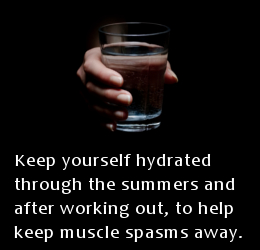Muscles spasm or muscle cramp is that awkward, painful and stiffening feeling, associated with sudden shortening or contraction of muscles and can be cured effectively with slow and gradual stretching.

We all have had one at some point of time. A muscle spasm is a common occurrence, when you stretch your body beyond a point, under conditions of heat and dehydration. When undernourished and overworked, running low on energy and fluids, muscles undergo spasms (short painful contractions). Through this Buzzle article, I provide you with an overview of the symptoms, causes and treatment methods to cure muscle spasms.
Muscle Functioning
The name of muscle originates from the Latin word '
musculus', meaning the little mouse. It is a group of contractile tissues which has origination in the mesodermal germ cells of an embryo. Muscles, with their contractile behavior are mainly responsible for body movements.
In normal cases, these voluntary muscles start contracting, when brain sends electrical signals along motor neurons, the nerve cells. These motor neurons act as a catalyst and stimulate the activation of calcium ions, within the cells of a muscle. There are two types of proteins present in the muscle cells-Actin and Myosin. The release of calcium ions leads to interaction of these ions with proteins, which results in sliding of proteins past one another. These motions of proteins result in contracting the muscle cell by pulling their stationary ends. Recapture of ions leads to unlinking of proteins and results again in relaxing of muscle.
Muscle Spasm
Sometimes, people have an awkward feeling of tightness in muscles of their back, neck, arms or legs. Sportspersons, athletes or the people involved in strenuous activities get cramps in their muscles. Both these forms are known as muscle spasms.
A muscle spasm is an unexpected, sudden, abrupt, involuntary contraction or shortening of any single muscle or group of muscles. Generally it is characterized by sudden burst of unpleasant, painful sensation.
Every muscle in body is susceptible to muscle spasm, although it is more common in calf muscles or muscles of the back or neck. When muscle spasm is witnessed by the body, muscle does not relax after sudden stiffening. When it occurs in legs, it is also known as '
Charley Horse'.
Usually, these muscle cramps crop up from simple fatigue of muscles, after sudden heavy exercise when muscle is not habituated to extra loads. It can also occur during pregnancy. However, there are few instances when electrolyte imbalances or disorders in neuromuscular functions trigger spasms. Also, it can be a side effect of certain medications. The sudden movements, particularly a sudden, tweaking movement can catalyze spasms. Gradual and slow stretching tends to be effective solution in such cases.
Mechanism Behind Muscle Spasms
In abnormal conditions, unusual contraction activity of muscle cells at any stage can result in these spasms. There is certain mechanism between the brain and the spinal cord and motor neurons of the central nervous system to regulate contraction activity. Disruption of this system leads to spasm. Any of the following reasons can play a role in disturbance of the mechanism:
- Being over-sensitive, motor neurons may go weird in their functioning.
- Stimulation takes place without proper contraction, as muscle sheath itself is very sensitive.
- Released Calcium ions may not get recaptured in time, leading to prolonged contraction of muscles.
Possible reasons behind the interruption of brain mechanism includes injured nerve pathways, stroke, trauma, multiple sclerosis, spinal cord injury, overly stress on specific muscles. Sometimes, nerve damage can result into contracture, a permanent shortening of muscle.
Causes and Treatment
- Poor supply of oxygen to muscle cells, is regarded as one of the premiere reasons behind spasms or cramps. This can be treated with deep and slow breathing. A soft massage and slow stretching can be very effective in such cases.
- Electrolyte Disturbance, which includes Hypokalemia, characterized by deficiency of potassium and Hypocalcemia, deficiency of calcium is other main cause. This can be overcome by introducing supplementary diet containing calcium and potassium.
- Dehydration is perhaps the most instrumental factor behind cramps. Sodium loss in muscles, due to dehydration, produces limb and abdominal cramps. Drinking plenty of water, with increased intake of salts can do wonders.
- Muscle Trauma is an excessive stress on muscles causing mild to severe cramps. The affected area may be inflamed, swollen, or reddened. This is usually characterized by a snapping sound when injury occurs. Application of an ice pack, rest and slow stretching is again very useful.
- Menstruation is also one of the important causes of cramps of varying magnitude in the abdomen. Menstrual spasms can be overcome with heat application using heating pads, stretching exercises, treatment of ibuprofen.
- Nocturnal Spasms are the muscle cramps that locate in the calves, soles of the feet at night or at the time of rest. They are painful if mixed with the condition of dehydration. These happen due to low levels of magnesium, calcium, potassium, and sodium and prolonged sitting.
So, whenever muscle spasms appear, it is of utmost importance that all preventive measures be taken, like slow stretching and increased water intake, to counter the pain that follows.


 We all have had one at some point of time. A muscle spasm is a common occurrence, when you stretch your body beyond a point, under conditions of heat and dehydration. When undernourished and overworked, running low on energy and fluids, muscles undergo spasms (short painful contractions). Through this Buzzle article, I provide you with an overview of the symptoms, causes and treatment methods to cure muscle spasms.
We all have had one at some point of time. A muscle spasm is a common occurrence, when you stretch your body beyond a point, under conditions of heat and dehydration. When undernourished and overworked, running low on energy and fluids, muscles undergo spasms (short painful contractions). Through this Buzzle article, I provide you with an overview of the symptoms, causes and treatment methods to cure muscle spasms.